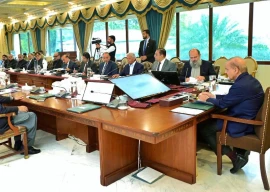
ISLAMABAD:
Bhayya Ram is not happy. A representative of the scheduled caste Hindu community in Rahim Yar Khan, he has taken strong offence to the newly drafted bill of marriage registration for scheduled caste Hindus.
While most, including Ram, would think that legal recognition of Hindu marriages is a good thing, he is disappointed by the inclusion of the proverbial exit clause — divorce.
“Once married, a couple is wedded for life. There is no concept of divorce in Hinduism as we have practiced for centuries,” said Ram, a representative of the scheduled caste Hindu community in Rahim Yar Khan.
According to Ram, a majority of scheduled caste Hindus are perturbed by inclusion of the divorce option, saying that the very concept of divorce is against their religious beliefs.
However, religious beliefs have become tightly intertwined with economic realities.
“The new legislation would open new controversies in case of divorce, because poor Hindus cannot afford to give inheritance rights to girls,” Ram told The Express Tribune.
Curiously, India, home to almost 90% of the world’s Hindu population, does allow divorce. As practiced in India, a Hindu woman acquires right to her husband’s inheritance.
“So even if she gets a divorce, she can also claim a share in her ex-husband’s inheritance,” explained Ram. He said that new legislation would only benefit upper-class Hindus, and 4.7 million lower class Hindus will be in trouble. The community was not consulted before the bill was tabled in the lower house of the parliament, he said.
The National Assembly recently referred the bill to a parliamentary committee for legal input.
“The Hindus are the largest minority of Pakistan, with more than 90% belonging to the scheduled caste,” another community member said, adding that the bill was tabled by MNA Kishan Chand Parwani, who is from the community’s upper castes, and he did not bother to take lower caste Hindus on board.
Parwani said that the process of consultation is still underway and that he plans to hold more meetings with scheduled caste Hindus. But, Parwani said, divorce rights cannot be denied.
“How can we compel someone to stay [in a failed relationship]?” he asked.
However, Guru Sukhdeo Jev, a religious leader, explained the importance of making marriages work in Hinduism and opined that the absence of a divorce option strengthened women economically, as in many cases when a divorced man dies, his brothers will simply divide his assets among themselves and ignore the ex-wife. “How can a woman survive if she is deprived of her inheritance [after her ex-husband dies] in the name of divorce?”
Ramesh Jaipal, a social activist, who had also proposed a bill on the issue, said that it is shocking for them to see the new bill that was prepared in haste by seven upper-caste Hindus. “Our demand was only the introduction of an act for marriage registration, and the inclusion of the divorce option is against the community’s faith,” Jaipal opined.
Responding to a question, Jaipal said that being a secular state, India included the “modern concept” of divorce in the Marriage Registration Act, “but our community cannot afford this in Pakistan.”
Published in The Express Tribune, January 14th, 2012.


































































COMMENTS
Comments are moderated and generally will be posted if they are on-topic and not abusive.
For more information, please see our Comments FAQ